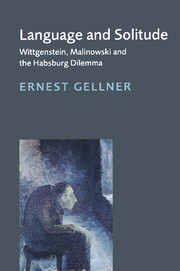Book contents
- Frontmatter
- Contents
- Preface
- Foreword
- Part I The Habsburg dilemma
- Part II Wittgenstein
- 10 The loneliness of the long-distance empiricist
- 11 The poem to solitude, or: confessions of a transcendental ego who is also a Viennese Jew
- 12 Ego and language
- 13 The world as solitary vice
- 14 The mystical
- 15 The central proposition of the Tractatus: world without culture
- 16 Wittgenstein mark 2
- 17 Tertium non datur
- 18 Joint escape
- 19 Janik and Toulmin: a critique
- 20 The case of the disappearing self
- 21 Pariah communalism
- 22 Iron cage Kafka-style
- Part III Malinowski
- Part IV Influences
- Part V Conclusions
- General bibliography
- Bibliographies of Ernest Gellner's writings on Wittgenstein, Malinowski, and nationalism
- Index
20 - The case of the disappearing self
Published online by Cambridge University Press: 05 March 2010
- Frontmatter
- Contents
- Preface
- Foreword
- Part I The Habsburg dilemma
- Part II Wittgenstein
- 10 The loneliness of the long-distance empiricist
- 11 The poem to solitude, or: confessions of a transcendental ego who is also a Viennese Jew
- 12 Ego and language
- 13 The world as solitary vice
- 14 The mystical
- 15 The central proposition of the Tractatus: world without culture
- 16 Wittgenstein mark 2
- 17 Tertium non datur
- 18 Joint escape
- 19 Janik and Toulmin: a critique
- 20 The case of the disappearing self
- 21 Pariah communalism
- 22 Iron cage Kafka-style
- Part III Malinowski
- Part IV Influences
- Part V Conclusions
- General bibliography
- Bibliographies of Ernest Gellner's writings on Wittgenstein, Malinowski, and nationalism
- Index
Summary
The individualistic, atomistic tradition began with the invocation of the self. In Quine's excellent and already cited phrase, what Descartes recommended was ‘cosmic exile’: the inquiring mind opted out of the existing stock of ideas and information, and started afresh, relying on the data which were indubitably in its possession. In reality, however, the essence of this operation was cultural rather than cosmic exile. What the Cartesian operation really required was sustained, systematic distrust of the assumptions of the local culture, and the erection of a body of knowledge intended to stand outside it and be independent of it. The self opted out of the culture; it was also initially rewarded with a kind of hard, gem-like status of a ‘substance’, a thing capable of existing on its own. Thought, at any rate, was credited with such a status by Descartes. It was a substance, capable of existing on its own. It was independent and, above all, it was independent of culture. When it liberated itself from its culture, it nevertheless retained the tools for thinking about the world, and retrieved them in a purer and hence more effective way.
But this metaphysical elevation of the self to substantial status was not due to last very long. The very principles of sustained doubt, by means of which the self had tried to liberate itself from culture, and which it was meant to serve, also undermined its own status. Within the tradition initiated by Descartes, a century or so later the existence of that hard, substantial self was subjected to severe scrutiny.
Information
- Type
- Chapter
- Information
- Language and SolitudeWittgenstein, Malinowski and the Habsburg Dilemma, pp. 96 - 99Publisher: Cambridge University PressPrint publication year: 1998
